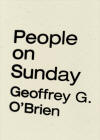People on Sunday
Geoffrey G. O’Brien’s People on Sunday took me a long time to finish because his poems thrilled me so much. Many pieces in People on Sunday demand an immediate reread upon completing the final lines. Often O’Brien tucks clues, hints, and foreshadowing into his poems. These hints blossom with much more depth and meaning during the second (or third and sometimes fourth) read. My fingers could hardly turn the pages backward fast enough to satisfy my urge to devour some of these poems again.
Geoffrey G. O’Brien’s People on Sunday took me a long time to finish because his poems thrilled me so much. Many pieces in People on Sunday demand an immediate reread upon completing the final lines. Often O’Brien tucks clues, hints, and foreshadowing into his poems. These hints blossom with much more depth and meaning during the second (or third and sometimes fourth) read. My fingers could hardly turn the pages backward fast enough to satisfy my urge to devour some of these poems again.
O’Brien’s reread-ability should land this book in the hands of many poetry lovers; however, that is far from the only reason to enjoy his work. He seems to effortlessly stretch and challenge his readers with his diction and selection of poem subjects. For instance, “D’Haussonville” could stand alone as a beautifully crafted poem. It opens with the following lines:
A town no one lives in
Must be everywhere around us
Accounting for the hysteria
Of any pose. As we see into
The laugh of things fields or folds
Of wrinkled blue appear divided
Into secondary propositions
Of a primary fact, that fronts are lighter
Than backs because attention glows
Since I was unfamiliar with the subject, what I believed I was reading about is quite different than where O’Brien leads me throughout the poem and up until its delightful ending:
Like the dream of seeing hidden things
And the hugest process therein
The blue only refers, is “of,” genetic
And hard to kill off. It is 1845
Forever when the painting is completed
Though she herself is no longer
Twenty-Four or anatomically
Incorrect as he has made her here.
Although I quickly turned the pages back for an instant rereading, I also researched the painting, town, and people before embarking on my third, and much more fully developed, reading. To my knowledge, I had never seen the painting before, and if I had, I am almost certain I wouldn’t have seen it quite the way O’Brien captured it in his poem. Even so, after reading his poem, it seems to me as if I will always see this painting through his eyes.
Similarly, O’Brien often represents the world in the most strikingly uncommon way. His own words will do this phenomenon the most justice, so here are few examples I found particularly intriguing. “Give no credence to initial thoughts / That round things love form more / Than angled ones.” “Amazingly, they are in the same apartment / Reading parts of one paper / By the inadvertent clock of a faucet / Leaking.” In reference to an exerciser upstairs, he writes, “She goes longer and longer, / Mastering her fear of being out of breath.” Tucked within the lines, in almost every poem, readers can find jewels similar to these.
For poetry and language lovers, O’Brien’s interpretation of the world gives an added rush. In a few of his poems, he writes about poetry, poets, or poems. Even in this niche, his work can stand independently or be enhanced by familiarity with the work of the people who appear in the poem.
As for lovers of language, his observations, such as the one in this passage, made this linguistically trained reviewer pause in appreciative reflection:
She is upstairs which means I have no choice
But be downstairs in the present-past,
Which is the difference between affect and effect
Before pronunciation lets you know
Whether either is not the other or a verb
Cleared for takeoff but second in line.
From language play to enriching subjects, O’Brien has mastered an artist’s (or poet’s) dream—making the audience want more. Fortunately for his readers, more is as simple as turning back the pages and rekindling the spark.





